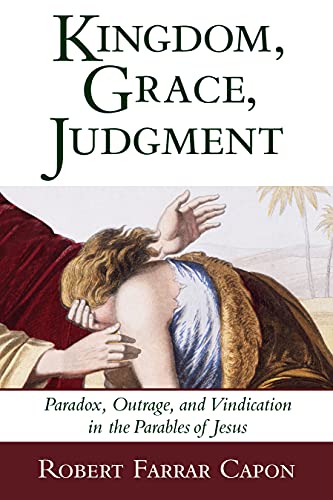Tonight we are discussing chapter 7 on the Parable of the Lamp and the Parable of the Growing Seeds and Chapter 9 on the Parable of the Mustard Seeds in Rev. Robert F. Capon’s book Kingdom, Grace, and Judgment – Paradox, Outrage, and Vindication in the Parables of Jesus. (We will be discussing Chapter 8 on the Parable of the Weeds next week.) These are the parables that are told directly after the parable of the Sower and Seeds as found in Mark 4. Fr. Kimel’s teaching on these parables (from which I have borrowed liberally) is here.
The Context:
In the Gospel of Mark, the Parable of the Sower is immediately followed by three short parables – the lamp, the growing seed, and the mustard seed. Mark 4:21-32. The question that arises is how do these parables help illuminate the parable of the Sower. Remember, in reading these parables we are talking about the unassuming power of seeds (small, hidden, and sacrificial) as illustrative of the left-handed power of God disclosed to us in the person of Jesus.
The Mustard Seed:
In Mark 4, Jesus tells four parables: the Sower, the Lamp, the Growing Seeds, and the Mustard Seed. This final parable begins with Jesus mussing over what further example he can use to demonstrate the nature of the Kingdom of God:
How may we depict the Kingdom of God, or by what parable may we present it? As a grain of mustard that, when sown upon the soil, is smaller than all the seeds on earth, And when it is sown it rises up and becomes larger than all the garden-herbs, and produces great branches, so that the birds of the sky are able to shelter under its shade. Mark 4:31-32
We can see Jesus thinking about how he will wrap this first time that he taught in parables. This parable about the smallest of sown seeds is also one of the smallest parables concerning the Kingdom. Similar to the Parable of the Growing Seeds, the Mustard Seed further distills Jesus’ teaching of the Sower to its most basic teaching. As Capon writes, there is no hint of eschatology (concern with end-times) or evil. There is no bad soil or bad plants. There is only and simply the Kingdom in this final parable.
The Meaning of the Mustard Seed:
The Kingdom is a like a Mustard Seed. As Capon tells us, the kingdom is the very thing sown, not something that results from the sowing of a seed other than itself. p. 98. The Kingdom is the seed itself, not the resulting bush. The bush which puts forth branches upon which the birds can rest and reproduce is merely the result of the Kingdom being sown. The seed itself, which is sown by God, is the very power of God working. Within the four great themes of the parables, we have the Catholicity of the seed being sown throughout the earth, the Mystery of the smallest of seeds being the source of the Kingdom, and the Actuality that the Kingdom is working. What the parable does lack is any element of Hostility and Response. The Kingdom simply is, and no one and nothing can prevent the Kingdom from being sown or manifesting its glory and neither is anyone nor anything necessary for the Kingdom to be sown and be manifest. As its most basic level, there is nothing but the Kingdom and the God who sows it.
Kapon ends his discussion of the mustard seed with this summary: The real point of the parable is the marvelous discrepancy between the hiddenness of the kingdom at its sowing and the lush, manifest exuberance of it in its final, totally successful fruition. “So you want me to tell you about the end of the story, do you?” Jesus seems to be saying. “Well, here it is; but without a word about evil to throw you into your usual eschatological tailspin. All you get here is the peaceable kingdom: the sun shining in the sky, birds flying in and out of the shade, and all the little ones twittering away forever and ever. No elements of hostility to tempt you to think the kingdom won’t arrive unless you ride shotgun for it. And no elements of response to suggest it might need your cooperation in order to come out right—unless, of course, you consider larking around in the trees a proper response; in which case, that I’ll let you have.” p.99
Dinner is at 6:30. The menu is quesadillas. Discussion about 7:15. Hope to see you here!
With many such parables he spoke the word to them, as they were able to hear it; he did not speak to them without a parable, but privately to his own disciples he explained everything.
Mark 4:33-34


Pingback: The Gospel of Luke – Luke 13 – Whose Kingdom – Ancient Anglican